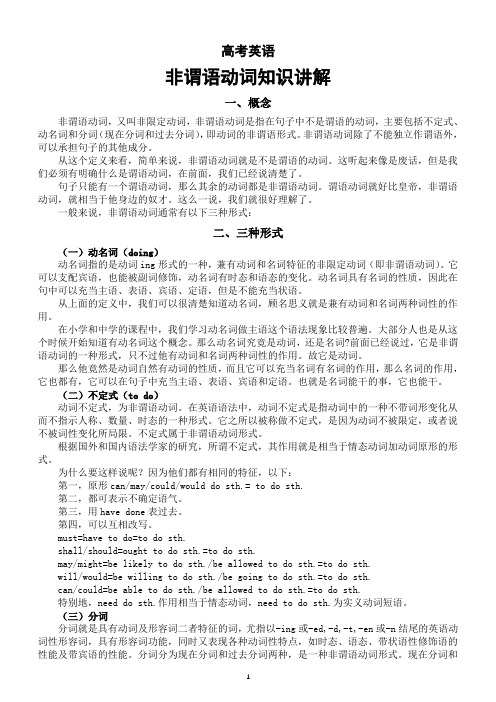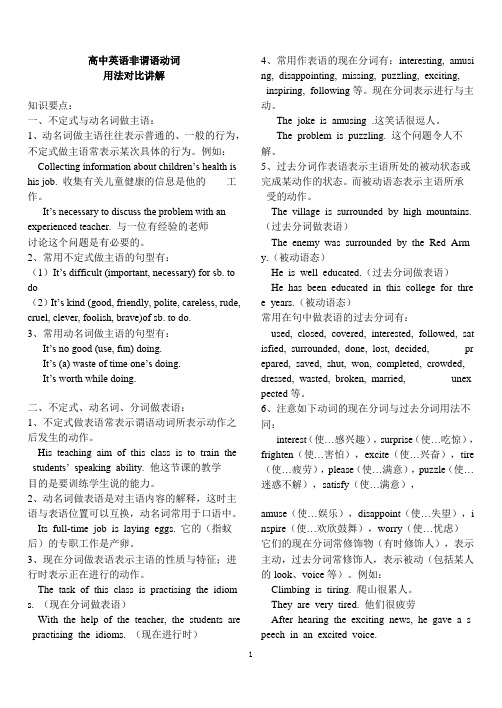(全)高中英语:非谓语动词重难点详解
高中英语语法 非谓语动词 全

非谓语动词非谓语动词。
在英语中,不能作句子谓语,而是担任其它语法功能的动词叫做非谓语动词。
非谓语动词的时态和语态的不同形式动词不定式动名词分词主动to do doing doing(同时,主动)被动to be done being done done(被动,完成)进行主动to be doing进行被动being done进行,被动主动完成to havedone having done having done(主动,完成一般作状语)被动完成to havebeen done having beendonehaving beendone(被动,完成一般作状语)非谓语动词在句中的作用主语宾语表语补语定语状语不定式√√√√√√动名词√√√√分词√√√√一:分词(现在分词和过去分词,分别表示:主动,行进&被动,完成)1)作定语The girl standing by the window is my sister.=The girl who is standing by the window is my sister.This is a book written by a famous Chinese writer.= This is a book which was written by a famous Chinese writer.2) 作状语(一般表示时间,原因,条件,伴随)有时可将从句中when/while /unless/if 等保留(While/When)Walking in the street ,I saw her.=While/When I was walking in the street ,I saw her.(表示时间)Seen from the hill,our school looks more beautiful.=When our school is seen from the hill,it looks more beautiful.从小山上看,我们学校更美了。
语法专题 非谓语动词重难点分类强化及练习答案 -2022届高考英语总复习

第三组 Having done 做状语,表达having done动作发生在 谓语动词之前完成
• 1.__H_a_v_i_n_g_w__o_rk_e_d__ (work) for two days, Steve managed to finish his report on schedule.
• 2._H_a_v_i_n_g_o_v_e_r_c_o_m_e_ (overcome) all difficulties, Mr. Li and all the students smiled in relief.
• 3.The manager, h_a_v_i_n_g_m__a_d_e__ (make) it clear to us that he didn’t agree with us, left the
• meeting room. • 4._H_a_v_i_n_g_a_r_r_iv_e_d_ (arrive) early for his date, Mark spent time
• 14.By far, there are many problems ____l_e_ft______ (leave) to be solved.
•
15.A beggar in rags stood there with at the steak牛排on the plate盘子.
his
eyes
__s_t_a_ri_n_g______
•非谓语动词重难点分类强化 练习+讲解
第一组 动词作定语:being done正在被;done已被;to be done 将要被
1.The stadium体育场 __b_e_in_g__b_u_il_t_____ (build) at present目前 in our city is intended for为…打算/设计 the coming Asian Games.
高中英语高考复习非谓语动词知识讲解

高考英语非谓语动词知识讲解一、概念非谓语动词,又叫非限定动词,非谓语动词是指在句子中不是谓语的动词,主要包括不定式、动名词和分词(现在分词和过去分词),即动词的非谓语形式。
非谓语动词除了不能独立作谓语外,可以承担句子的其他成分。
从这个定义来看,简单来说,非谓语动词就是不是谓语的动词。
这听起来像是废话,但是我们必须有明确什么是谓语动词,在前面,我们已经说清楚了。
句子只能有一个谓语动词,那么其余的动词都是非谓语动词。
谓语动词就好比皇帝,非谓语动词,就相当于他身边的奴才。
这么一说,我们就很好理解了。
一般来说,非谓语动词通常有以下三种形式:二、三种形式(一)动名词(doing)动名词指的是动词ing形式的一种,兼有动词和名词特征的非限定动词(即非谓语动词)。
它可以支配宾语,也能被副词修饰,动名词有时态和语态的变化。
动名词具有名词的性质,因此在句中可以充当主语、表语、宾语、定语,但是不能充当状语。
从上面的定义中,我们可以很清楚知道动名词,顾名思义就是兼有动词和名词两种词性的作用。
在小学和中学的课程中,我们学习动名词做主语这个语法现象比较普遍。
大部分人也是从这个时候开始知道有动名词这个概念。
那么动名词究竟是动词,还是名词?前面已经说过,它是非谓语动词的一种形式,只不过他有动词和名词两种词性的作用。
故它是动词。
那么他竟然是动词自然有动词的性质,而且它可以充当名词有名词的作用,那么名词的作用,它也都有,它可以在句子中充当主语、表语、宾语和定语。
也就是名词能干的事,它也能干。
(二)不定式(to do)动词不定式,为非谓语动词。
在英语语法中,动词不定式是指动词中的一种不带词形变化从而不指示人称、数量、时态的一种形式。
它之所以被称做不定式,是因为动词不被限定,或者说不被词性变化所局限。
不定式属于非谓语动词形式。
根据国外和国内语法学家的研究,所谓不定式,其作用就是相当于情态动词加动词原形的形式。
为什么要这样说呢?因为他们都有相同的特征,以下:第一,原形can/may/could/would do sth.= to do sth.第二,都可表示不确定语气。
高中英语非谓语动词

高中英语非谓语动词用法对比讲解知识要点:一、不定式与动名词做主语:1、动名词做主语往往表示普通的、一般的行为,不定式做主语常表示某次具体的行为。
例如:Collecting information about children’s health is his job. 收集有关儿童健康的信息是他的工作。
It’s necessary to discuss the problem with an experienced teacher. 与一位有经验的老师讨论这个问题是有必要的。
2、常用不定式做主语的句型有:(1)It’s difficult (important, necessary) for sb. to do(2)I t’s kind (good, friendly, polite, careless, rude, cruel, clever, foolish, brave)of sb. to do.3、常用动名词做主语的句型有:It’s no good (use, fun) doing.It’s (a) waste of time one’s doing.It’s worth while doing.二、不定式、动名词、分词做表语:1、不定式做表语常表示谓语动词所表示动作之后发生的动作。
His teaching aim of this class is to train the students’ speaking ability. 他这节课的教学目的是要训练学生说的能力。
2、动名词做表语是对主语内容的解释,这时主语与表语位置可以互换,动名词常用于口语中。
Its full-time job is laying eggs. 它的(指蚁后)的专职工作是产卵。
3、现在分词做表语表示主语的性质与特征;进行时表示正在进行的动作。
The task of this class is practising the idiom s. (现在分词做表语)With the help of the teacher, the students are practising the idioms. (现在进行时)4、常用作表语的现在分词有:interesting, amusi ng, disappointing, missing, puzzling, exciting, inspiring, following等。
(英语)高三必备英语非谓语动词技巧全解及练习题(含答案)含解析

(英语)高三必备英语非谓语动词技巧全解及练习题(含答案)含解析一、单项选择非谓语动词1.He had wonderful childhood, _____with his mother to all corners of the world.A.travel B.to travel C.traveled D.traveling【答案】D【解析】【详解】考查非谓语动词。
句意:他有着美好的童年,跟母亲到过世界各地。
分析句子可知,travel 用非谓语动词形式,逻辑主语He与travel之间为主谓关系,因此用现在分词作状语。
故选D。
2.The recent financial crisis into account, the Japanese boss back on the number of employees working for him.A.taking; cuts B.was taken; cutC.taken; cut D.to take; cutting【答案】C【解析】【详解】考查过去分词和一般过去时。
句意:考虑到最近的金融危机,日本老板削减了为他工作的员工人数。
分析句子可知,本句为一般过去时,主语为故the Japanese boss ,谓语为cut。
The recent financial crisis 与take在逻辑上是被动关系,所以用过去分词。
C选项正确。
3.When he was a boy, he used to go there and watch _____.A.to repair bicycles B.bicycles to be repairedC.bicycles being repaired D.repairing bicycles【答案】C【解析】4.After a decade or so, out of choices, he returned to where he’d begun, ashamed at having so little to show for his wanderings.A.being run B.runningC.to run D.having run【答案】D【解析】【详解】考查现在分词。
高中英语语法:非谓语动词(共48张PPT)

高中英语语法:非谓语动词(共48张P PT)
一、动词不定式
3.不定式的语态 不定式的主动式表示逻辑主语是其所表示的动作的执行者;不定 式的被动式表示逻辑主语是其所表示的动作的承受者。 I plan to study history of art at university so it is important for me to visit France.我打算在大学学习艺术史,因此访问法国对我来说是 重要的。(逻辑主语me是visit的动作执行者。) It is believed by many people to have been gradually covered over by sandstorms from AD 200 to AD 500.许多人认为它(古楼兰城) 在公元200年至500年期间逐渐被沙尘暴所覆盖。(it是cover动作 的承受者。)
高中英语语法:非谓语动词(共48张P PT)
高中英语语法:非谓语动词(共48张P PT)
一、动词不定式
(5)不定式作定语 动词不定式作定语时,须放在其修饰的名词或代词之后,通常与其所修饰的成 分之间存在着一定的逻辑关系。 I am always the first person to get to the office.我总是第一个到办公室。(不定式 与person之间是主谓关系) (6)不定式作状语 不定式作状语可以修饰动词,一般在句中作目的、结果和原因状语。不定式作 目的状语可以单独放在句首、句中或句末;作结果状语常用在下列句式中: so…as;such…as to;enough…to;only…to;too…to等。 To make friends easily, you need to be very kind.要想很容易地交朋友,你需要友 善。(不定式作目的状语) Arrived here to find everything was in chaos.到达这里后发现一切都是乱糟糟的。 (不定式作结果状语,表示意外或事与愿违的结果) I am so excited to be here!来到这我真激动!(不定式作原因状语)
高三英语非谓语动词解题技巧讲解及练习题(含答案)含解析
高三英语非谓语动词解题技巧讲解及练习题(含答案)含解析一、单项选择非谓语动词1.Bats are surprisingly long lived creatures, some ______ a life span of around 20 years. A.having B.had C.have D.to have【答案】A【解析】考查非谓语动词。
句意:蝙蝠是一种寿命很长的动物,有的寿命约为20 年。
根据与前面句子是逗号连接,没有连词,故判断后一句使用独立主格结构,空格处用非谓语动词,逻辑主语some 与have 是主谓关系,故要用v-ing 形式,故选A。
2.When _________ for his views about his teaching job, Philip said he found it veryinteresting and rewarding.A.asking B.askedC.having asked D.to be asked【答案】B【解析】试题分析:句意:当马克被问做教师这个职业时的看法。
他说他发现这个工作是非常有趣和值得的。
这里when 引导的省略句,完整的是when he was asked his view about his job as a teacher ,这里当从句中的主语与主句的主语一致,并且从句的谓语动词有be 时,这时从句的主语与be 同时省略,故选B。
考点:考查省略的用法。
点评:本题难度适中。
为了使话说得简明扼要,英语句子中某个单词、短语甚至从句或主句都可以省去。
这种省去句子某些成分而保持句子意思不变的现象,称为省略。
它是高中阶段的重要的语法项目,需要考生仔细分析句子结构,来确定省略的内容。
这里考生容易误选A。
即学即练:He is rather difficult to make friends with, but his friendship , ______ is more true than any other.A.once gainedC.after gaining解析:A。
高考英语总复习(专题攻略)之非谓语动词、助动词与情态动词 非谓语动词用法详解-人教版高三全册英语试题
非谓语动词用法详解非谓语动词根据其表示的动作的发生时间和意义可以有不同的形式。
非谓语动词形式不定式一般式:to do/to be done进展式:to be doing完成式:to have done/to have been done 否认式:not/never to dov.ing形式一般式:doing/being done完成式:having done/having been done 否认式:not doingv.ed形式否认式:not done非谓语动词的一般式表示与句子谓语动词同时或之后发生的动作;完成式表示在句子谓语动词之前发生的动作。
He is said to be studying abroad now.据说他在国外学习。
He is said to have studied abroad for 3 years.据说他在国外学习过三年。
The students went out of the classroom, laughing and talking.学生们说笑着走出了教室。
Having finished my homework, I went to bed.做完作业后,我回家了。
1) 非谓语动词作主语作主语的可以是不定式和动名词。
It is a great honor to be invited to speak here.受邀请在这发言是个荣幸。
Playing the piano is my hobby.弹钢琴是我的爱好。
It is no good telling him the news.告诉他这个消息没有好处。
注意it作形式主语代替动名词常出现在It is no use/good doing..., It is useful doing..., It is a waste of time doing...等句式里。
2) 非谓语动词作宾语作宾语的可以是不定式和动名词,但是不定式一般不作介词的宾语,如作介词宾语,不定式符号to前面往往有疑问词。
非谓语动词-备战新高考英语复习语法知识点全面梳理(全国通用)
③只表完成
fallen leaves developed countries 相当于形容词,表状态
risen sun a retired worker
I am satisfied.
1. 过去分词所作成分
1. I like reading the novels written by Liu Cixin.
the map on the wall
a dog lying on the ground
a film directed by James Cameron
1.过去分词作定语时一般兼有被动和完成的意义。
eg: 一枚用过的邮票 a used stamp
一个受伤的手指 an coin
Lesson 8
考点解密
非谓语动词是高考英语的必考点和难点,高考重点考 察非谓语动词做状语、表语、定语以及宾语补足语的用法区 别,以及固定搭配中的非谓语动词形式。
不仅如此,掌握非谓语动词的的基本用法,对增强书 面表达的文采和提高阅读理解能力都有明显的作用。
非谓语动词,又叫非限定动词,是指在句子中不是谓语的 动词,主要包括不定式、动名词和分词(现在分词和过去分 词),即动词的非谓语形式。非谓语动词除了不能独立作谓 语外,可以承担句子的其他成分。
stop –stopped
(重读闭音节结尾,末尾只有一个辅音字母)
shop plan admit drop prefer beg…
①表被动+完成
1. 过去分词功能
eg. Built years ago, the bridge needs to be repaired.
②只表被动
eg. Taken twice a day, the medicine will work fine for your cough.
高中英语非谓语动词知识点有哪些
高中英语非谓语动词知识点有哪些非谓语动词是高中英语二年级的一个重要语法项目。
非谓语动词理论内容抽象,种类多样,结构的建立形式复杂,习题设置难度大,今天小编为大家整理了高中英语非谓语动词知识点,供大家参考。
高中英语知识点:什幺是非谓语动词非谓语动词,又叫非限定动词,非谓语动词是指在句子中不是谓语的动词,主要包括不定式、动名词和分词(现在分词和过去分词),即动词的非谓语形式。
非谓语动词除了不能独立作谓语外,可以承担句子的其他成分。
高中英语知识点:非谓语动词定义在句子中充当除谓语以外的各种句子成分的动词形式,叫做非谓语动词(theNon- FiniteVerbs)。
非谓语动词也是动词的一种,他们有着动词的其他特点,可以充当主语、宾语、状语等。
非谓语动词与谓语动词是相对的概念。
高中英语知识点:不定式、动名词和分词不定式主动语态被动语态与谓语动词的关系一般式TodoTobedone动作发生在谓语动作之后进行式Tobedoing与谓语动作同时发生完成式TohavedoneTohavebeendone动作发生在谓语动作之前动名词主动语态被动语态与谓语动词的关系一般式DoingBeingdone与谓语动作同时发生完成式HavingdoingHavingbeendone动作发生在谓语动作之前现在分词主动语态被动语态与谓语动词的关系一般式DoingBeingdone与谓语动作同时发生完成式HavingdoneHavingbeendone动作发生在谓语动作之前高中英语知识点:非谓语动词详解总结不定式的作用高中英语知识点:1、作主语不定式作主语时,谓语用单数。
往往用it作形式主语,把不定式放在谓语后面。
高中英语知识点:2、作宾语(1)动词+不定式。
(2)动词+疑问词+to,“特殊疑问句+不定式”相当于名词,作宾语。
高中英语知识点:3、作宾。
- 1、下载文档前请自行甄别文档内容的完整性,平台不提供额外的编辑、内容补充、找答案等附加服务。
- 2、"仅部分预览"的文档,不可在线预览部分如存在完整性等问题,可反馈申请退款(可完整预览的文档不适用该条件!)。
- 3、如文档侵犯您的权益,请联系客服反馈,我们会尽快为您处理(人工客服工作时间:9:00-18:30)。
高中英语:非谓语动词重难点详解 一. 非谓语动词的含义 非谓语动词首先是一种动词形式,其次是这种动词形式不能做谓语,综合这两点,我们将其叫做非谓语动词。
二. 非谓语动词的形式 非谓语动词包含四种形式,即不定式、动名词、现在分词和过去分词。其中,每种形式按照发生时间和主被动又包括不同的子形式。具体如下:
1. 不定式 ①基本形式:to do(表示主动,并且一般表示将来) ②被动式:to be done(表示被动,并且一般表示将来) ③进行式:to be doing (表示主动和进行) ④完成时:to have done(表示主动和完成) ⑤完成被动式:to have been done(表示被动和完成) ⑥完成进行式:to have been doing (表示主动和完成进行) 例如: The teacher told us to do morning exercises . 老师让我们做早操。 The car to be bought is for his sister. 要买的这辆车是给他的姐姐的。 She pretended to be reading when the teacher came into the classroom. 老师进来时,她假装正在读书。 The thief is said to have escaped. 据说小偷已经逃跑了。 The thief is said to have been arrested. 据说小偷已经被抓住了。 She is said to have been working in the factory over the last 20 years. 据说在过去的20年里,她一直在这家工厂工作。 2. 动名词 ①基本形式:doing (表示主动) ②被动式:being done(表示被动) ③完成式:having done(表示主动和完成) ④完成被动式:having been done(表示被动和完成) 例如: Travelling in space by ordinary people will be common in the future. 在未来,普通人在太空旅行将会是普遍的事情。 Freddy and his band could go nowhere without being followed by their fans.
Freddy和他的乐队到哪里都被他们的粉丝跟着。 I have no idea of his having done such a thing against you. 我不知道他做过这样一件违背你的事情。 Many customers complain of having been given short weight at that shop.
很多顾客抱怨在那家商店被缺斤少两过。 3. 现在分词 ①基本形式:doing (表示主动和进行) ②被动式:being done(表示被动和进行) ③完成式:having done(表示主动和完成) ④完成被动式:having been done(表示被动和完成) He sat there,reading a newspaper. 他坐在那里,读着一张报纸。 The area being studied may be rich in coal. 这个正在被研究的地方可能富含煤。 Having finished my homework,I began to watch TV. 完成作业后,我开始看电视。 Having been told many times,she still can't remember it. 已经被告诉了很多次,她仍然记不住。 4. 过去分词:done 及物动词的过去分词表示被动或完成;不及物动词的过去分词表示主动或完成。 polluted river 被污染的河流 fallen leaves 落叶 注意:非谓语动词本身不能表示现在和过去。非谓语动词表示进行、将来和完成时是相对于谓语动作来说的:和谓语动作同时发生表示进行;发生在谓语动作之后表示将来;发生在谓语动作之前表示完成。
三. 非谓语动词的作用 非谓语动词除去不能做谓语之外,其它所有成分都可以做。具体如下。 1. 不定式:做主语、宾语、表语、定语、状语和补语。 To learn a foreign language is difficult .(作主语) 学会一门外语是很难的。 It’s easy to see their aunt.(作真正主语,it做形式主语) 很容易见到他们的姑姑。 Tom wanted to have a cup of beer.(作宾语) 汤姆想要喝杯啤酒。 His wish is to be a driver.(作表语) 他的愿望是当一名司机。 I have nothing to say.(作定语) 我没有什么可说的。 The teacher told us to do morning exercises . (作宾语补足语) 老师让我们做早操。 They went to see their aunt. (目的状语) 他们去见他们的姑姑。 2. 动名词:做主语、宾语、表语、定语和补语。 Learning English is very difficult .(作主语) 学英语非常困难。 I enjoy dancing.(作动词宾语) 我喜欢跳舞。 I have got used to living in the country.(作介词宾语) 我已经习惯了住农村。 His job is driving a bus.(作表语) 他的工作是开车。 3. 现在分词:做表语、定语、状语和补语。 The story is interesting. 这个故事有趣。 He sat there,reading a newspaper.(作状语) 他坐在那里,读着一张报纸。 The area being studied may be rich in coal.(作定语) 这个正在被研究的地方可能富含煤。 He saw the thief stealing some money from the bank.(作宾补) 他看到小偷正在从银行偷钱。 4. 过去分词:做表语、定语、状语和补语。 He is interested in the news.(作表语) 他对这则消息很感兴趣。 polluted river(做定语) 被污染的河流 Given more time,I can do my work better.(做状语) 如果再被多给些时间,我会把工作做得更好。 I found my watch stolen.(做宾补) 我发现我的手表被偷了。 四. 非谓语动词重、疑、难点。 1. 须用省去to 的不定式(do)作宾补的11个动词。 五看(see、watch、notice、observe、look at) 两听(hear、listen to) 三使(make、let、have) 一感觉(feel) 根据谐音记忆法,我们可以记做“吾看两厅三室一感觉”。 例如: I saw a big bird fly over the roof of the house yesterday. 昨天,我看到一只大鸟飞过了屋顶。 注意:以上11个动词,也可以接现在分词和过去分词作宾补,但在时间和语态上会有变化,我们以see为例来区分一下。
see sb. do sth. 看到某人做了某事 see sb. doing sth. 看到某人正在做某事 see sb./sth. done 看到某人/某物被...... I see him make the phone call. 我看到他打了电话。(他打电话的整个动作我都看见了) I see him making a phone call.我看到他正在打电话。(强调看到他正在打电话,并没有看见全过程.)
We often see him surrounded by much work. 我们常常看见他被大量的工作包围着. 2.只接不定式(不能接动名词)作宾语的25个常用动词 want、would like、wish、help、hope、learn、manage、offer、plan、afford、agree、arrange、ask、beg、care、choose、decide、demand、determine、expect、fear、prepare、pretend、promise、refuse
3. 只接动名词(不能接不定式)作宾语的28个常用动词 practice、consider、enjoy、finish、give up、imagine、keep、put off、risk、suggest、admit、advise、allow、appreciate、avoid、delay、deny、discuss、dislike、escape、excuse、fancy、forbid、mention、 mind、miss、permit、prohibit
4. 既可接不定式也可接动名词,但含义完全不同的8个动词 remember to do sth. 记住要做某事(未做) remember doing sth. 记得做过某事(已做) forget to do sth. 忘记去做某事(未做) forget doing sth. 忘记做过某事(已做) regret to do sth. 遗憾要做某事(未做) regret doing sth. 后悔/抱歉做过某事(已做) try to do sth. 努力做某事 try doing sth. 尝试做某事
